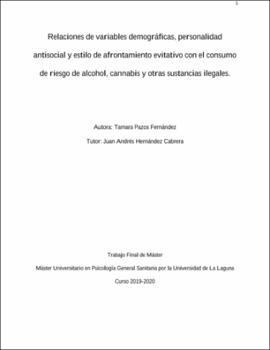Relaciones de variables demográficas, personalidad antisocial y estilo de afrontamiento evitativo con el consumo de riesgo de alcohol, cannabis y otras sustancias ilegales.
Autor
Pazos Fernández, TamaraFecha
2021Resumen
La existencia de relaciones entre la personalidad y las conductas adictivas es un tema de estudio desde los años 70 y aún no se ha conseguido concretar su naturaleza. En este estudio se
evalúa la interacción de la personalidad antisocial y el afrontamiento evitativo con el consumo de
alcohol, cannabis y otras sustancias, controlando otras variables demográficas. Estas variables se
suelen estudiar por separado, pero en pocas ocasiones se estudian conjuntamente. Éste es un estudio correlacional en el que participaron 266 personas rellenando un formulario online. Se pudieron replicar la mayor parte de resultados presentes en la literatura y se hallaron además interacciones complejas entre el estilo antisocial de personalidad y el afrontamiento evitativo. También se halló una relación mayor entre este afrontamiento y las conductas de adicción de más
riesgo y los consumos más frecuentes que con la simple presencia de consumo. No obstante, los
resultados, pese a ser significativos, no tienen una importancia clara. Es importante entender que
el estudio es limitado, por el tamaño de la muestra y por la falta de medición de otras variables
que pudieran ser relevantes; por lo que sería interesante para el futuro ampliar el número de variables estudiadas The relationships between personality and addictive behaviors have been a subject of study
since the 1970s and their nature has not yet been established. This study evaluates the interaction
of antisocial personality and avoidance coping pattern with the consumption of alcohol, cannabis
and other illegal substances, also controlling for other demographic variables. These variables
are usually studied separately but are rarely studied together. This is a correlational study in
which 266 people participated filling out an online form. Most of the results previously found in
the literature were replicated and complex interactions were also found between the antisocial
personality style and avoidance coping pattern. Furthermore, the influence of the avoiding coping style was higher in the riskier substance use. However, the results, despite being significant,
are not very reliable. It is important to consider that this study is limited due to the sample size
and the lack of measurement of other variables that could be relevant; so it would be interesting
for further investigation to expand the number of variables studied.





